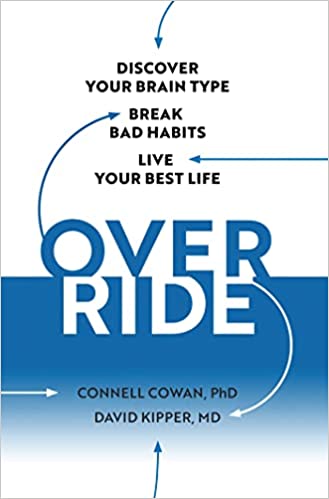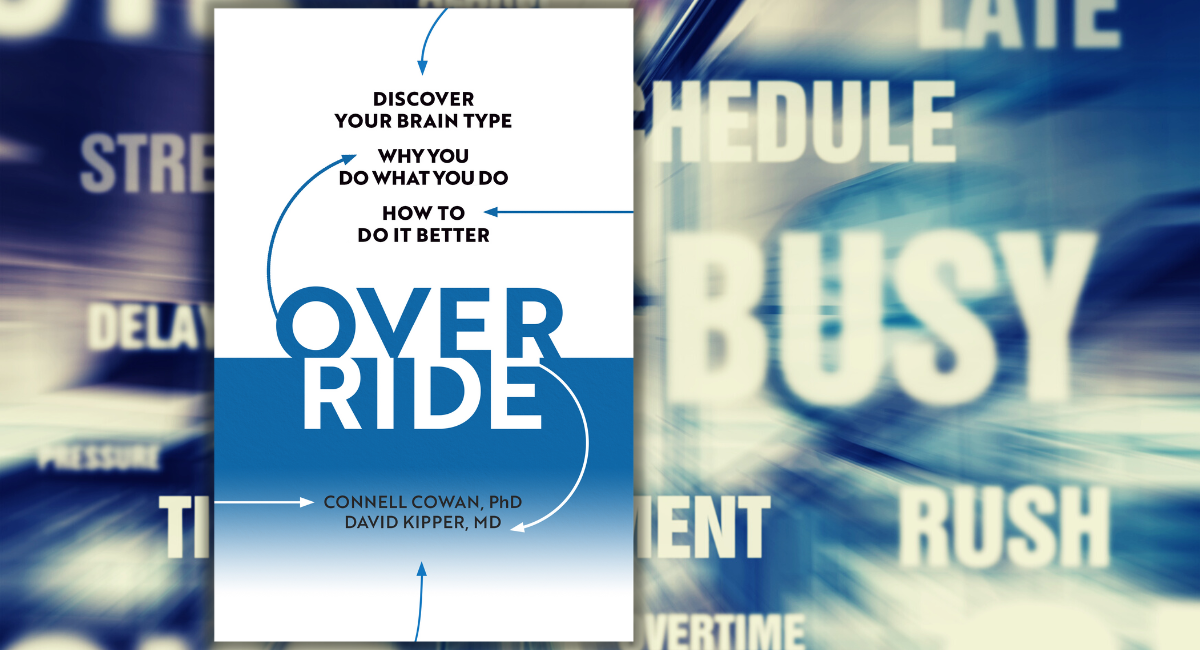Override: Discover Your Brain Type, Why You Do What You Do, and How to Do it Better by Connell Cowan, PhD and David Kipper, MD
If you’ve ever caught yourself “self-sabotaging” — binging on TV when there’s work to do, overeating when you’re already full, getting angry over something that doesn’t really matter — here’s a possible solution that readers can put into practice almost immediately.
In OVERRIDE: Discover Your Brain Type, Why You Do What You Do, and How to Do It Better (Citadel Press), co-authors Clinical Psychologist Dr. Connell Cowan and Physician of Internal Medicine Dr. David Kipper note that while we are biologically and psychologically predisposed to perform these behaviors, we can override that system if we so choose. We can decline to perform our most self-sabotaging behaviors and even reduce — if not eliminate entirely — the desire and temptation we have to perform them in the first place.
OUR PERSONAL BACKSTORIES
Cowan and Kipper explain in Override that we are biologically predisposed to certain behaviors, because of our neurochemistry — our brain’s and our body’s chemical balance, which we inherited from our parents, and they from theirs.
The duo refers to this neurochemistry as how we are “hardwired” to think, behave and react to all forms of stimulation. Much like the Type A and Type B personalities we’ve heard of, Cowan and Kipper believe there are two types of neurochemically balanced people: Swords and Shields. Swords typically approach a stimulating situation (and are commonly extroverts), while Shields will try to avoid the stimulation (and are commonly introverts). Where Shields feel an equivalent of pain or danger when they are stimulated, Swords experience a sense of reward.
Swords and Shields will experience these opposing reactions in every situation, good or bad. Whether it’s a social gathering, an important occasion, a tough day at work or a legitimately stressful situation, Swords will typically face the event head-on while Shields will seek some way of avoiding it. This phenomenon explains our relationship with stress, as well as our persistence in seeking out comfort (and what qualifies as “comforting” to us personally).
But while it might be perceived as a positive to void out stress and experience comfort, which is commonly associated with happiness or contentment, Cowan and Kipper say there is such a thing as too much of a good thing — including comfort. Because of our persistence in seeking out comfort and avoiding stress, the authors believe that we have created an environment for ourselves where it is more difficult for us to achieve goals and see progress, and where self-destructing, addictive behaviors rule.
PUT INTO PRACTICE
My favorite part of the book appeared in the last few chapters. Most of the book is centered around Swords and Shields and how they perform in various situations. This was endlessly helpful information and incredibly eye-opening. But I was looking forward to the next part: how to change it. While I can understand being biologically predisposed to perform in a certain way, I wanted to hear what Connell and Kipper had to say about overriding that predisposition — and I was not disappointed.
Written in an engaging and friendly style, there are real-life examples in every chapter of this book, of at least one person who identifies as a Shield and one person who identifies as a Sword, how they interact with the subject from that chapter (for example, their home environment or their time at the office) and how they could override that habit and interact in a better way. I found these examples to be incredibly helpful in applying the information and thinking about how I could apply it in my own life. But after laying the foundation throughout most of the book, the final three chapters harness that information and focus strictly on overriding behaviors – specifically as they relate to food and exercise, sleep and how we engage with stress. But to be clear, the book is not written in a judgmental way but a welcoming one — welcoming us into a new, more meaningful lifestyle.
In our relationships with food, exercise, sleep and stress, there are ways — whether we identify as Swords or Shields — that we can look at how we typically engage in any given situation, and we can choose to behave differently. But looking at our biological background and engaging with the emotions that we feel during those moments, we can choose to respond in a different way — and the more we do that, the more we can build a new habit. And the more we build that habit, the closer we will get to Connell and Kipper’s goal of vying away from behaviors and comforts that are counterintuitive to our progress, our success and our happiness.
FUTURE YOU WILL THANK YOU
I’ve always enjoyed books like this — ones that discuss psychology and biology in a digestible way, give examples of everyday life and offer action steps — so I had a feeling from the beginning that I was going to enjoy, and put into practice, this book. And I know I’m far from the only person who struggles with stress, prioritizing tasks and life categories, and taking care of my body and mind the way that I should. But I did not expect this book to be as eye-opening, helpful and supportive as it turned out to be.
If you ever struggle with juggling tasks, make poor choices for yourself late at night or during crunch time — or if you just feel like you could be living a happier, more fulfilling, less stressful life — this book will especially be worth your time.
I immensely enjoyed it, and I’m sure my notes in the margins are going to gradually overtake the book as I revisit it over time.
About Dr. Connell Cowan:
Dr. Connell Cowan is a clinical psychologist practicing in Los Angeles, California. He co-wrote Smart Women/Foolish Choices, a runaway bestseller that spawned an entire genre of books dealing with male/female dilemmas. The book spent nearly a year on the New York Times bestseller list, sold millions of copies, has been published in 23 different languages, and was made into a hit musical in Japan. His second book, Women Men Love/Women Men Leave, also became an NYT bestseller. Husbands & Wives completed the relationship trio. He has appeared on hundreds of radio and television shows and his writings have been published in a number of journals, magazines, and newspapers internationally. Dr. Cowan also established the Human Sciences Center in Los Angeles — a non-profit center for research and treatment funded in part by a grant from the Eli Lilly Foundation. The innovative work he developed at the Center was featured on CBS’s “60 Minutes.” He has taught at the California School of Professional Psychology and in UCLA’s School of Public Health. Along with his writings and clinical practice, Dr. Cowan has created and produced a number of television and video projects for syndication and cable blending both psychological information and drama.
About Dr. David Kipper, MD.:
Dr. David Kipper has practiced internal medicine in Los Angeles for over three decades. He has appeared as an expert commentator on all major networks, has produced numerous programs on health and health care, appeared on the Today Show, and contributes to the Huffington Post. Dr. Kipper is currently a co-host for ABC radio’s The Medical Show, a weekly national call-in show addressing all areas of medicine. After 12 years on the air, The Medical Show will be syndicated to a wide national audience with podcasts and a web presence that advocates for patients seeking personalized solutions to complicated health problems. Dr. Kipper co-founded the Medical Group of Beverly Hills, the largest multidisciplinary healthcare provider in Los Angeles. He also co-founded the California Institute for Behavioral Medicine, a mind-body approach to managing stress, incorporating conventional and homeopathic therapies that TIME Magazine described as “groundbreaking.” Dr. Kipper’s 2010 book, The Addiction Solution (Rodale Press, 2010), helped create a paradigm shift in the treatment of this disease from a behavioral malady to a chronic medical illness, determined by our unique brain chemistry and triggered by stress.




